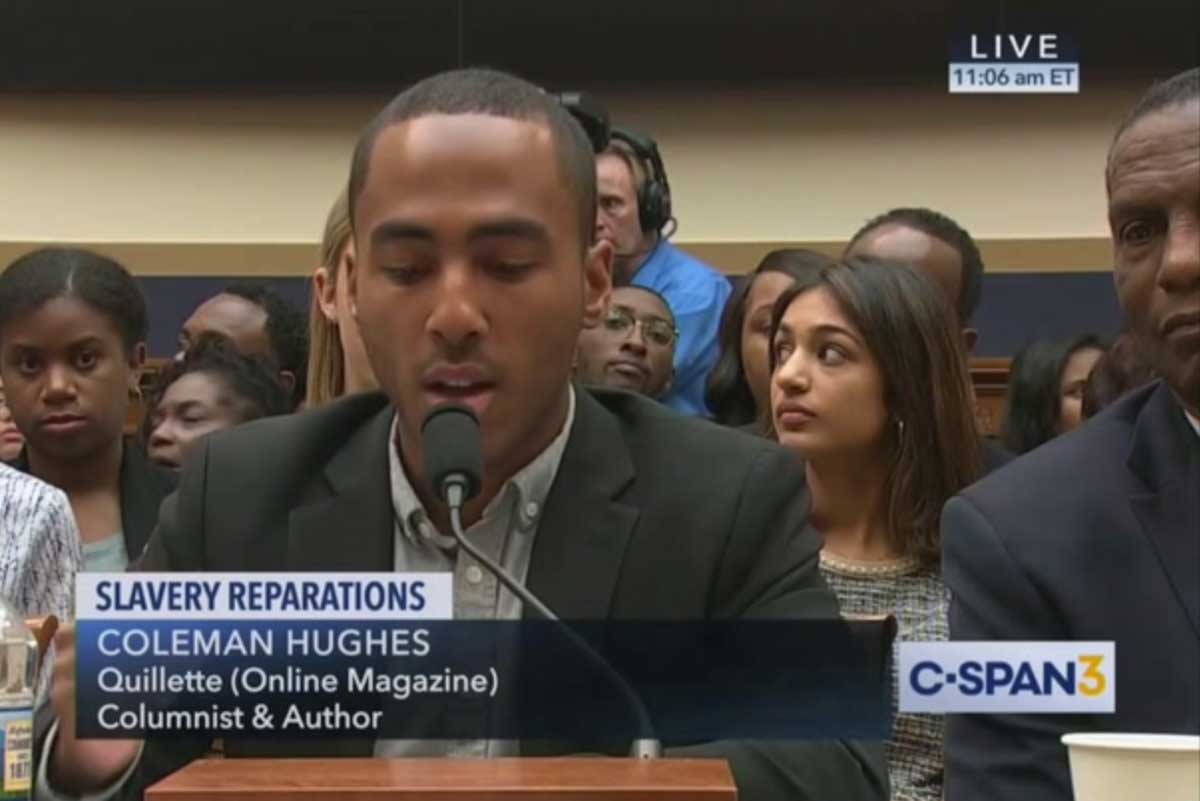History
My Testimony on Reparations
Racism is a bloody stain on this country’s history, and I consider our failure to pay reparations directly to freed slaves after the Civil War to be one of the greatest injustices ever perpetrated by the U.S. government.

Editor’s note: Coleman Hughes delivered the following testimony at a United States House Judiciary subcommittee hearing on Bill H.R. 40 on June 19, 2019. If passed, the bill would establish a commission for reparations.
Thank you Chairman Cohen, ranking member Johnson, and members of the committee. It’s an honor to testify on a topic as important as this one.
Nothing I’m about to say is meant to minimize the horror and brutality of slavery and Jim Crow. Racism is a bloody stain on this country’s history, and I consider our failure to pay reparations directly to freed slaves after the Civil War to be one of the greatest injustices ever perpetrated by the U.S. government.
But I worry that our desire to fix the past compromises our ability to fix the present. Think about what we’re doing today. We’re spending our time debating a bill that mentions slavery 25 times but incarceration only once, in an era with zero black slaves but nearly a million black prisoners—a bill that doesn’t mention homicide once, at a time when the Center for Disease Control reports homicide as the number one cause of death for young black men. I’m not saying that acknowledging history doesn’t matter. It does. I’m saying there’s a difference between acknowledging history and allowing history to distract us from the problems we face today.
In 2008, the House of Representatives formally apologized for slavery and Jim Crow. In 2009, the Senate did the same. Black people don’t need another apology. We need safer neighborhoods and better schools. We need a less punitive criminal justice system. We need affordable health care. And none of these things can be achieved through reparations for slavery.
Nearly everyone close to me told me not to testify today. They said that even though I’ve only ever voted for Democrats, I’d be perceived as a Republican—and therefore hated by half the country. Others told me that distancing myself from Republicans would end up angering the other half of the country. And the sad truth is that they were both right. That’s how suspicious we’ve become of one another. That’s how divided we are as a nation.

If we were to pay reparations today, we would only divide the country further, making it harder to build the political coalitions required to solve the problems facing black people today; we would insult many black Americans by putting a price on the suffering of their ancestors; and we would turn the relationship between black Americans and white Americans from a coalition into a transaction—from a union between citizens into a lawsuit between plaintiffs and defendants.
What we should do is pay reparations to black Americans who actually grew up under Jim Crow and were directly harmed by second-class citizenship—people like my Grandparents.
But paying reparations to all descendants of slaves is a mistake. Take me for example. I was born three decades after Jim Crow ended into a privileged household in the suburbs. I attend an Ivy League school. Yet I’m also descended from slaves who worked on Thomas Jefferson’s Monticello plantation. So reparations for slavery would allocate federal resources to me but not to an American with the wrong ancestry—even if that person is living paycheck to paycheck and working multiple jobs to support a family. You might call that justice. I call it justice for the dead at the price of justice for the living.

I understand that reparations are about what people are owed, regardless of how well they’re doing. But the people who were owed for slavery are no longer here, and we’re not entitled to collect on their debts. Reparations, by definition, are only given to victims. So the moment you give me reparations, you’ve made me into a victim without my consent. Not just that: you’ve made one-third of black Americans—who consistently poll against reparations—into victims without their consent, and black Americans have fought too long for the right to define themselves to be spoken for in such a condescending manner.
The question is not what America owes me by virtue of my ancestry; the question is what all Americans owe each other by virtue of being citizens of the same nation. And the obligation of citizenship is not transactional. It’s not contingent on ancestry, it never expires, and it can’t be paid off. For all these reasons bill H.R. 40 is a moral and political mistake. Thank you.







